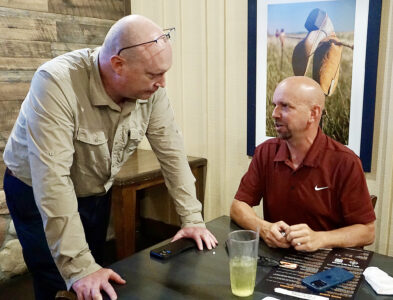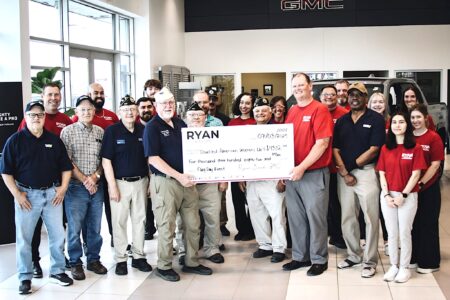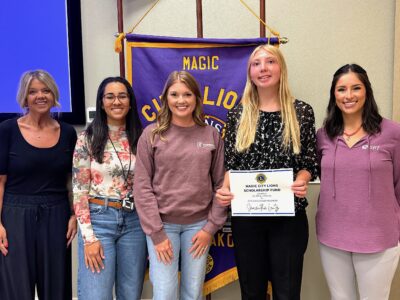Recovery Reinvented sheds light on addiction: Keynote speakers share testimonies, experiences

Scott Davis shared his journey to sobriety during his keynote speech at Recovery Reinvented on Thursday afternoon at Minot State University’s Ann Nicole Nelson Hall. Davis, founder and CEO of Tatanka Consulting Group, has been sober for 17 years. Photo by Rick Heit.
Three keynote speakers, Dr. Lipi Roy, Dr. Stephen Loyd and Scott Davis, took to the stage to share personal testimonies and experience as professionals in addiction treatment during the seventh annual Recovery Reinvented event held on Thursday at Minot State University.
Recovery Reinvented, created by First Lady Kathryn Burgum, is an event dedicated to ending the shame and stigma surrounding addiction.
Dr. Lipi Roy is an internal medicine physician who is board-certified in addiction medicine. She is the founder of SITA MED, an addiction and health-speaking company. She was a frontline healthcare worker during COVID and oversaw treatment and recovery services at Rikers Island, the nation’s second-largest jail complex in New York. In her speech she discussed the intersection of the COVID and substance use disorder (SUD) and described them as “colliding epidemics.”
Roy also discussed the root causes for addiction and the strong correlation of a stress event and the risk for developing an addiction. She gave examples such as divorce, unemployment, fear, shame, anger and grief and that if patients don’t cope adequately, they turn to “self-medication” to deal with strong feelings.
She also spoke on the importance of meeting patients where they are. A majority of incarcerated individuals also struggle with addiction. She said correctional facilities are also addiction and mental health facilities and should be treated as such.
Roy also pointed out that stigma is a major barrier to seeking help, being labeled an “addict” is socially discrediting. By changing the language used around SUD, she hopes more individuals will seek treatment and there will be less disregard from healthcare professionals who label those who suffer from addiction as “less motivated,” “violent,” and “manipulative” and provide suboptimal care.
She concluded her speech by encouraging audience members to practice self care by using mindful practices, getting adequate sleep, hydrating and doing what they enjoy to avoid burnout, frustration and promote overall life satisfaction.
Scott Davis served as executive director of the North Dakotan Indian Affairs Commission from 2009-2021 and as the head of Native American Community Outreach for Sanford Health’s Bismarck region where he advocated for Native American patients to have access to healthcare services. He shared his testimony of recovery from alcohol and drug use at Recovery Reinvented.
During college, Davis said he found it difficult to fill time, which was inevitably filled by going out to bars and drinking. He started missing class, sleeping in and fell behind in his classes. He eventually dropped out of college and went home to a disappointed family.
According to Davis, he went to Heartview, a treatment facility, but “fell off the wagon several times ” He said he was caught in a vicious cycle of being in recovery for a year and then relapsing. He slipped deeper into addiction and started smoking marijuana and experimenting with other drugs. When his wife became pregnant, she kicked him out and Davis went to his uncle, who scolded him. He sought treatment one more time and was able to remain sober.
Davis spoke about the immense fulfillment he gets from loving and providing for his family. He also spoke on his political and social growth and how he was afraid that his past addictions would come up in interviews. Davis brought up Gov. Doug Burgum’s first state of the state address where the conversation of the stigma of addiction was brought up. He said it was a moving moment for him.
Davis ended his testimony saying, “You are loved by many. It may not feel like it sometimes because of our guilt, our trauma, whatever it is we did in our past — don’t let your past define you. People are always there to help you. You are not alone.”
Dr. Stephen Loyd, an internal and addiction medicine physician who currently serves as the vice president of the Tennessee Board of Medical Examiners, has served as an expert witness to more than 20 state and federal cases against physicians who were improperly prescribing controlled substances.
Loyd has been in addiction recovery for 19 years. He shared his testimony of being a physician in an intensive care unit treating patients while on Oxycontin and Xanex.
Loyd started off his speech by sharing a picture of a turtle on top of a fence post. He said the turtle didn’t get there on his own and that someone put it there and that everybody in recovery is a turtle on a fencepost, “I’m here because I had people step into my life and love me when I was unlovable and put me where I am. Everybody in recovery has that,” he said.
He also shared testimonies from treating patients in active addiction and the stigma they faced from other healthcare professionals. He shared the story of a patient in rural Tennessee who was kicked out of a teaching facility when she started to have withdrawal symptoms after receiving treatment for a heart issue. The patient later developed a skin infection on her shin where she would inject heroin and instead of seeking medical intervention, she went to her local pet store and purchased antibiotics intended for fish to treat herself and to avoid judgment.
Loyd also shared the story of Brooke Sargent, a patient of his who started addiction treatment under his care at eight weeks pregnant. He pointed out that addiction services for pregnant women is lacking and that most treatment facilities won’t accept expecting mothers, and if women become pregnant while undergoing treatment, they risk being kicked out. Loyd stepped up to fill the gap and started treating Sargent. Sargent “got clean” until she had her daughter, Ava, but fell into trouble with the law and was eventually arrested.
Loyd went on to say there are two systems of care, “One for people who got money and one for everybody else,” he said. “I’m a doctor, I cost too much money to make. I got high quality treatment, I was paid the whole time I was gone. I didn’t get disciplinary action on my license. I had a way of living when I got out. Brooke got put in jail. Brooke had her medication stopped by a jailer with no medical training, no medical license. She had her psychiatric medications stopped by a jailer who allowed her to withdraw on the floor for 30 days and when she got out she didn’t get referral to treatment. Brooke didn’t get any of that. Brooke got treated as less than because that’s the system of care we have.”
Sargent eventually died of a drug overdose. Loyd shared a screen capture of her obituary next to a picture of Ava, the 2-year-old daughter she left behind. He pointed out that Ava already has an ACE score of two — an ACE score is a tally of different types of abuse, neglect and other hallmarks of a rough childhood. A higher score is linked to a higher chance of developing health issues later in life, such as addiction. Loyd said without early intervention, Ava has a nearly 100% chance of entering the system in the next decade.
Loyd finished his speech by speaking about the impact and enrichment his children have had on his life. He said everybody in recovery is like a turtle on a fence post – they didn’t get there by themselves and it takes effort to keep it there.



